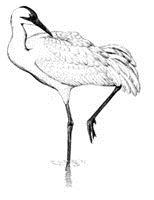North American Crane Working Group

Proceedings of the North American Crane Workshop
Date of this Version
2008
Document Type
Article
Citation
Resolutions passed by the North American Crane Working Group. In: Folk, MJ and SA Nesbitt, eds. 2008. Proceedings of the Tenth North American Crane Workshop, Feb. 7-10, 2006, Zacatecas City, Zacatecas, Mexico: North American Crane Working Group. p. 179.
Abstract
Florida Crane habitat resolution
Florida has the largest population of non-migratory sandhill cranes in the world and winters a significant portion of the eastern population of greater sandhill cranes. And in Florida, efforts are underway to introduce migratory and non-migratory whooping cranes. In order to successfully establish and sustain these populations, appropriate habitat needs to be available. About 40% of Florida’s best crane habitat has been lost between 1973 and 2003, and the amount has increased since then. Because of this, these valuable populations of cranes are finding it more difficult to locate suitable habitat. We the NACWG by this resolution request that the Governor and Cabinet of the State of Florida give priority consideration to acquiring and managing suitable habitat throughout Florida; for without such efforts these populations will decline and no longer be a part of Florida’s legacy to the nation and the world.
Host resolution
Participants of the Tenth North American Crane Workshop hereby express their thanks and appreciation to the local Zacatecas organizing committee, to Miguel Angel Diaz for facilitating our use of the Museo Rafael Coronel, to the state of Zacatecas for the support they provide, and to Felipe Chavez-Ramirez for bringing this workshop together. The North American Crane Working Group recognizes and is grateful for the time and effort spent by all who joined forces to make this workshop among the most memorable yet.
Included in
Behavior and Ethology Commons, Biodiversity Commons, Ornithology Commons, Population Biology Commons, Terrestrial and Aquatic Ecology Commons


Comments
Reproduced by permission of the North American Crane Working Group.